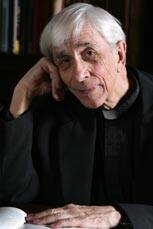With summer close and American vacationers heading abroad even in these recessionary times, my eye caught sight of a travel book shelved down the hall from my office at America. Little Women Abroad: The Alcott Sisters’ Letters From Europe, 1870-1871 met my hopes for taking a trip with them.
The European tour of Louisa May, her artist sister, also named May, and a friend was hardly the kind typified by such newly rich Jamesian characters as the American Daisy Miller, with their sojourns in sumptuous hotels. The Alcotts stayed initially in small boarding houses (pensions); and although they did eventually reach Florence and Rome, they passed their first two months in the French town of Dinan. The tenor of their visit there was quiet. “Nothing very astonishing has happened,” Louisa writes contentedly to the family back home, but that suited Louisa’s needs. Exhausted by her writing efforts, and suffering from rheumatism (“my wretched bones...never stop aching,” she writes), a local doctor prescribed “a little opium” to help her sleep.
Famous as the author of Little Women, Louisa May’s earnings helped with the daily expenses of the family back in Concord, Mass. But she urged them not to neglect their needs: “Don’t go poor...or I shan’t feel I had any right to be here so idle,” she says in one good-natured letter. Meals at the pension in Dinan were enormous. In one of her own letters home, May speaks of breakfast as consisting of “omulette [sic], such as only the French can make, cold meat chops, toast, tea and oatmeal pudding.” Not surprisingly, they claimed to grow “perceptibly fat from day to day.”
They were delighted at the modest cost of the pension, which included a salon of their own where they wrote their letters and a “sleeping room” with canopied beds. The book includes a sketch of that and the salon, along with one of the landlady, a servant and other boarders.
Since there were several dressmakers in Dinan, the sisters took advantage of the low cost of living by ordering fabric from Paris and then having dresses locally made. So numerous were their purchases, in fact, that on reaching Tours, they bought a large trunk, “for things accumulate fearfully and we have no room now without crushing our clothes.” In major tourist cities like Geneva, lodging costs rose “for we have to stop at good hotels being women”—a telling comment on the perceived dangers of travel abroad for unaccompanied women in 19th-century Europe.
As Protestants, the Alcotts were dismissive of the “good deal of mumbo jumbo” spoken by Catholic priests at one church they visited, though they spoke admiringly of “a boy with a lovely voice up in the choir like a little angel among the clouds.” During a train ride, they sat opposite “a little priest, so young that we called him Rev. Boy.” Louisa May adds with amusement that he stole sly looks at “my buckled shoes which were like his own and seemed to strike him as a liberty on my part.”
Wherever English-speaking people crossed their paths, the Alcott name, well known even abroad by then, attracted attention. At a small town in Switzerland, May wrote: “Lu’s fame follows her even here...for yesterday a New York lady and her two stylish daughters were quite excited on looking over the hotel-book to see Miss Alcott’s name, and...enquired if it was the Miss Alcott who wrote ‘Little Women,’” and were much impressed when they found it was “the lion.” But when the Franco-Prussian war broke out, they decided to start for home, where Louisa May would continue her writing career until her death at 56. A brief life, even for those times. Her work, though, clearly remains in the public eye today, as the shelves of schools and public libraries here and abroad can testify.








